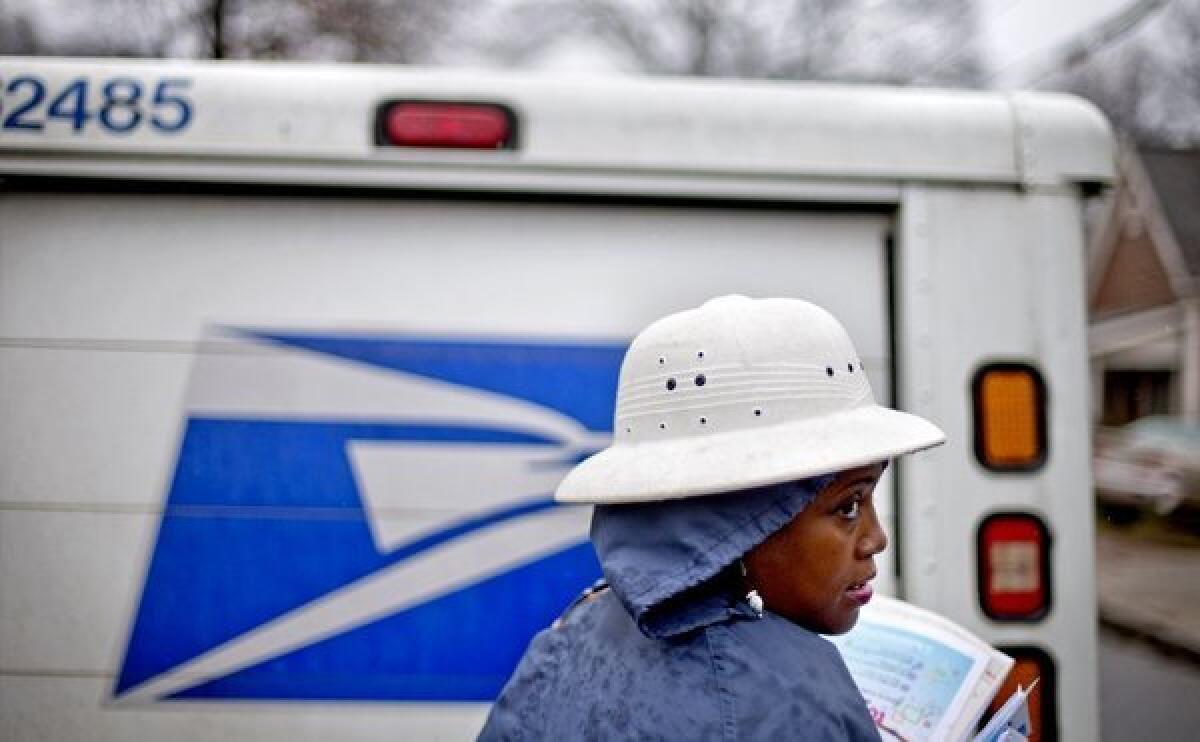How the post office became a potent weapon for Democrats

- Share via
WASHINGTON — As Democrats hastily rewrite their playbook for the pandemic era, targeting voter anxieties that now include medical testing, corporate bailouts and collapsing supply chains, one chapter is proving unexpectedly resonant.
Its working title could be “Don’t Mess with USPS.”
The financially imperiled post office — long a punching bag for the right — has become a surprisingly potent and resilient symbol for a fractured Democratic Party anxious for unifying causes. President Trump’s persistent attacks on the institution amid the public health crisis, and his vows to starve it of cash until it bends to his will, have unleashed a torrent of political trouble for him.
Anachronistic and balky though it may be, voters of all political persuasions appear to adore the post office: 91% of Americans view the U.S. Postal Service favorably, the highest ratings of any federal agency, the nonpartisan Pew Research Service recently found.
And at a moment when the Postal Service is the embodiment of so many causes dear to Democrats — a diverse, unionized workforce, a ticket to the middle class for hundreds of thousands, a linchpin to the expansion of voting by mail, a force of front-line workers soldiering though the pandemic, a lifeline to rural America, a large government program that mostly works — Trump’s threats to let it go broke are playing into their hands.
“Republicans and Trump are miscalculating where the public is,” said Rep. Gerald E. Connolly (D-Va.), who is helping lead congressional efforts to save the Postal Service as the pandemic pushes it into a cash crunch that could leave it insolvent by September.
“This is a beloved service and institution in the American people’s minds. They want it helped.”
A bipartisan Postal Preservation Caucus has emerged in the House. Celebrity-infused campaigns to #SaveThePostOffice trend online. A petition to save the Postal Service has generated 380,000 signatures, and some 120,000 people have requested “We Love Mail Carriers” stickers from MoveOn.org in a matter of days.
The Democratic Party and large progressive groups are finding the Postal Service cause to be among their most effective fundraising messages, and 100 major progressive groups just began a campaign framing its potential collapse as a civil rights issue because of its long-standing role as an entry point into the middle class for African Americans.
“It is shocking to me how much this is growing,” said Matt Hildreth, executive director of RuralOrganizing.org, which launched the petition.
There is now even an official anthem to the fight after North Carolina bluegrass musician Joe Troop released a banjo ballad: “A Plea to the U.S. Government to Fully Fund the Post Office.”
Before the coronavirus, the Postal Service was operating with only a small taxpayer subsidy, but it now faces significant economic problems. The shutdown of business caused by the virus has cut its revenue. At the same time, it has a longer-term burden: a mandate imposed by Congress in 2006 that it pre-fund the retirement benefits of its 630,000 employees, a requirement not imposed on other agencies.
As the service skids toward broke, the Trump administration is blocking access to a $10-billion line of credit made available in the recently enacted federal stimulus packages. A Trump loyalist, Louis DeJoy, will be positioned to push that agenda from the inside when he takes over as postmaster general in mid-June. The decision by the Republican-controlled Postal Service Board of Governors to appoint DeJoy, a top GOP donor who is heading efforts to raise money for this summer’s Republican National Convention, was announced Wednesday.
Trump is demanding the Postal Service quadruple the price of package delivery and cede control of key management functions to his administration rather than the service’s quasi-independent Board of Governors. He called the service a “joke.”
The vitriol is playing into charges that Trump is motivated by a vendetta against Jeff Bezos, the billionaire owner of the Washington Post — which Trump despises — and Amazon, which would take a financial hit if package rates soared.
Trump’s math has been repeatedly challenged — including by the Board of Governors. Raising the rates for packages threatens to reduce revenue by driving away business, Postal Service managers say.
Meanwhile, the president’s demand that the Postal Service bill customers in remote rural areas the full cost of delivering mail and packages has given Democrats a new inroad in those largely conservative communities. Voters there see such affordable deliveries as a lifeline and a right enshrined in the Constitution, which specifically authorized Congress to establish post offices.
“There are a lot of rural voters and citizens out there who are represented by Republicans who care a lot about not losing the Postal Service,” Minnesota Sen. Amy Klobuchar, a Democrat, said during a call with reporters Tuesday.
Get our L.A. Times Politics newsletter
The latest news, analysis and insights from our politics team.
You may occasionally receive promotional content from the Los Angeles Times.
“It is part of a small group of issues where Trump voters don’t follow the leader,” said Democratic pollster Geoff Garin, whose firm has also released a recent survey on voter attitudes toward the Postal Service. “Even when you invoke President Trump’s name, many of his own supporters abandon him on this. Voters in rural areas and seniors are among the most likely to feel this is a lifeline for them.”
The stature of the post office in progressive politics is also surging as the institution is intricately tied to another push that Democrats see as a winner for them: voting by mail. As states rush to expand mail balloting amid a pandemic that has made in-person voting unsafe, Trump is rallying Republicans to try to stop them, warning the party suffers when restrictions on casting votes by mail are eased.
That has moved even the Democratic Party’s presumptive presidential nominee to focus on the president’s antipathy for the post office.
“Now what in God’s name is that about?” Joe Biden said during an April 23 campaign event. “Other than trying to let the word out that he’s going to do all he can to make it very hard for people to vote. That’s the only way he thinks he can possibly win.”
Democrats are pushing post office relief that goes far beyond the $10-billion loan that Trump won’t release. The congressional Postal Preservation Caucus — which includes two Republicans — is backing a $75-billion plan proposed by the service’s governors. A third of the money would be in the form of a bailout. The rest would be used to modernize the service’s fraying infrastructure — some of its letter carriers and truckers, for example, are working out of late-1980s-vintage vehicles — and to give the Postal Service access to “unrestricted borrowing” from the U.S. Treasury.
Supporters of the Postal Service note that Trump’s resistance to helping comes as his administration enthusiastically backed relief for airlines, which, unlike the post office, until recently were plowing profits into stock buybacks and lavishing executives with big bonuses.
The disparity crystallizes the progressive argument against Trump’s agenda. Sen. Bernie Sanders of Vermont, a longtime backer of the post office, recently introduced his massive internet following to the leaders of the major postal unions in a Postal Service-focused virtual town hall that stretched on longer than an hour.
“This is an institution that was here before the country was founded, and in times like this, people are less apt to take it for granted,” one of the participants, Mark Dimondstein, president of the American Postal Workers Union, said in an interview.
He ticked off the many reasons many Americans are rushing to the defense of the post office, including the hordes who have recently purchased sheets of stamps in a sign of solidarity.
The Postal Service is one of the country’s largest employers of veterans, with 97,000 on the payroll. And post office jobs also helped elevate tens of thousands of African American families into the middle class during the civil rights era. Its workforce remains one of the most diverse in America.
“The post office is literally going to run out of money because of this pandemic,” Dimondstein said. “It’s a moment of crisis that brings us to a fork in the road. I don’t think the people of this country are going to allow what belongs to them to be stolen.”
More to Read
Get the L.A. Times Politics newsletter
Deeply reported insights into legislation, politics and policy from Sacramento, Washington and beyond. In your inbox twice per week.
You may occasionally receive promotional content from the Los Angeles Times.











